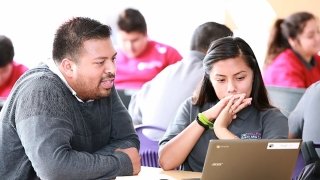Editor’s note: The following content was adapted from Gale Sinatra’s 2021 USC Rossier commencement address to graduating students. Science Denial, Why it Happens and What to Do About It, a book Sinatra co-authored with Barbara Hofer, is available now.
My neighbor told me she is not going to get the COVID-19 vaccine because she eats organic.
Some people believe that climate change is an existential threat to humanity and others say it’s a hoax.
As professional educators, we have been trained to evaluate evidence, think critically and be open to new information. Democracies depend on educated citizens to make informed decisions that will benefit not only their health and well-being, but that of their communities, their nation and the planet.
These decisions must be made thoughtfully, so they won’t have differential impacts on diverse groups in our society, particularly the poor and communities of color.
What can you do to support the development of critical thinking in others? Here are five recommendations.
1. Foster a scientific attitude in yourself and others
An important step you can take is to value science. Stay open to new evidence and foster an appreciation of science in those around you.
Thinking scientifically entails adopting a scientific attitude and the willingness to change views in light of new evidence.
The disposition to think critically and analytically must be nurtured and encouraged because our natural tendency is to make quick judgments and move on.
2. Be aware that learning science involves how students think and feel about the content
Students young and old get excited, inspired, curious, anxious, confused, and frustrated when learning about science. These emotions should not be ignored but recognized for what they are: Fully integrated aspects of human learning.
For example, doomsday messaging about a pandemic or climate change is more likely to induce stress than promote learning.
Help students direct their feelings toward proactive steps they can take as individuals. These include lowering their carbon footprint or helping their school conserve energy, even as they are learning that the solutions are much larger than individual actions.
3. Be aware of prior beliefs, attitudes and identity
Imagine two groups of college students in a general education science course learning about genetic modifications to crops, one in California and one in Nebraska.
Californians might be concerned about whether GMO are safe to eat and want foods to be labeled, while Nebraskans might know how crops are modified to make them more drought-tolerant. They may be concerned that GMO labeling will put family farms out of business.
Being aware of differences in science beliefs and attitudes is critical to discussing controversial science topics.
4. Be savvy about your own search strategies and support digital literacy in your students
You may have seen on Facebook that chocolate causes cancer or that the COVID vaccines contain microchips designed by Bill Gates.
Far too much information about science is gleaned from online sources that are unreliable and in some cases designed to deceive.
Follow best practices for identifying the source of this information and teach these practices to your students.
Before you share articles that appear to have a scientific basis, become your own fact-checker.
Evaluate connections between sources of evidence and alternatives before you decide whether the claim is plausible.
Only share information you have verified.
And if it is fake, don’t share it even as a joke because this is one way misinformation goes viral.
5. Encourage students to apply science to solve real problems
Students at all levels should address science questions that connect to their experiences.
Remember those experiments you did in high school chemistry? Yeah, neither do I.
If you engaged in science experiments that were not of interest to you, it’s unlikely they were a memorable learning experience.
Actively engaging students of all ages in asking and answering questions they care about, questions that solve actual problems, is much more effective.
The skills learned in scientific thinking and reasoning can and should be applied to relevant questions students want to ask and answer.





